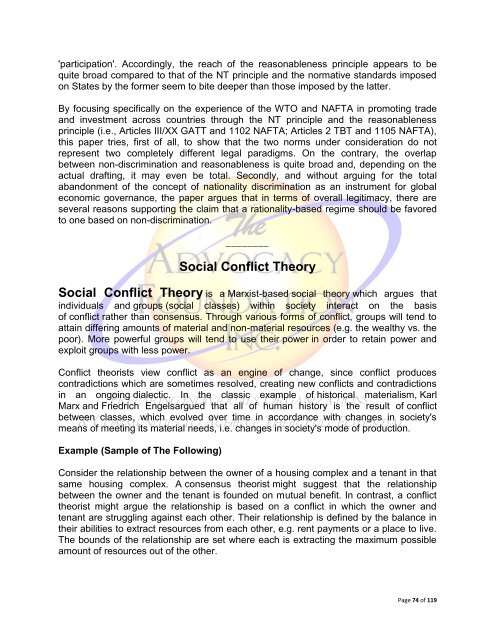International Legal Evangelism: Intelligence, Reconnaissance & Missions
International Legal Evangelism: Intelligence, Reconnaissance & Missions
International Legal Evangelism: Intelligence, Reconnaissance & Missions
Create successful ePaper yourself
Turn your PDF publications into a flip-book with our unique Google optimized e-Paper software.
'participation'. Accordingly, the reach of the reasonableness principle appears to be<br />
quite broad compared to that of the NT principle and the normative standards imposed<br />
on States by the former seem to bite deeper than those imposed by the latter.<br />
By focusing specifically on the experience of the WTO and NAFTA in promoting trade<br />
and investment across countries through the NT principle and the reasonableness<br />
principle (i.e., Articles III/XX GATT and 1102 NAFTA; Articles 2 TBT and 1105 NAFTA),<br />
this paper tries, first of all, to show that the two norms under consideration do not<br />
represent two completely different legal paradigms. On the contrary, the overlap<br />
between non-discrimination and reasonableness is quite broad and, depending on the<br />
actual drafting, it may even be total. Secondly, and without arguing for the total<br />
abandonment of the concept of nationality discrimination as an instrument for global<br />
economic governance, the paper argues that in terms of overall legitimacy, there are<br />
several reasons supporting the claim that a rationality-based regime should be favored<br />
to one based on non-discrimination.<br />
________<br />
Social Conflict Theory<br />
Social Conflict Theory is a Marxist-based social theory which argues that<br />
individuals and groups (social classes) within society interact on the basis<br />
of conflict rather than consensus. Through various forms of conflict, groups will tend to<br />
attain differing amounts of material and non-material resources (e.g. the wealthy vs. the<br />
poor). More powerful groups will tend to use their power in order to retain power and<br />
exploit groups with less power.<br />
Conflict theorists view conflict as an engine of change, since conflict produces<br />
contradictions which are sometimes resolved, creating new conflicts and contradictions<br />
in an ongoing dialectic. In the classic example of historical materialism, Karl<br />
Marx and Friedrich Engelsargued that all of human history is the result of conflict<br />
between classes, which evolved over time in accordance with changes in society's<br />
means of meeting its material needs, i.e. changes in society's mode of production.<br />
Example (Sample of The Following)<br />
Consider the relationship between the owner of a housing complex and a tenant in that<br />
same housing complex. A consensus theorist might suggest that the relationship<br />
between the owner and the tenant is founded on mutual benefit. In contrast, a conflict<br />
theorist might argue the relationship is based on a conflict in which the owner and<br />
tenant are struggling against each other. Their relationship is defined by the balance in<br />
their abilities to extract resources from each other, e.g. rent payments or a place to live.<br />
The bounds of the relationship are set where each is extracting the maximum possible<br />
amount of resources out of the other.<br />
Page 74 of 119

















